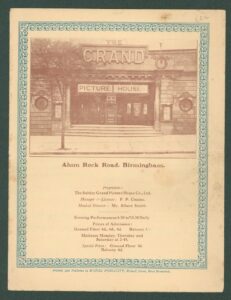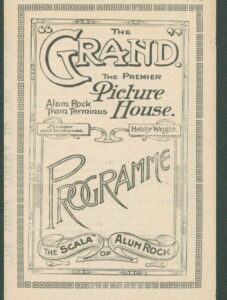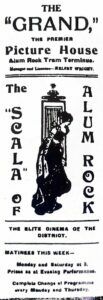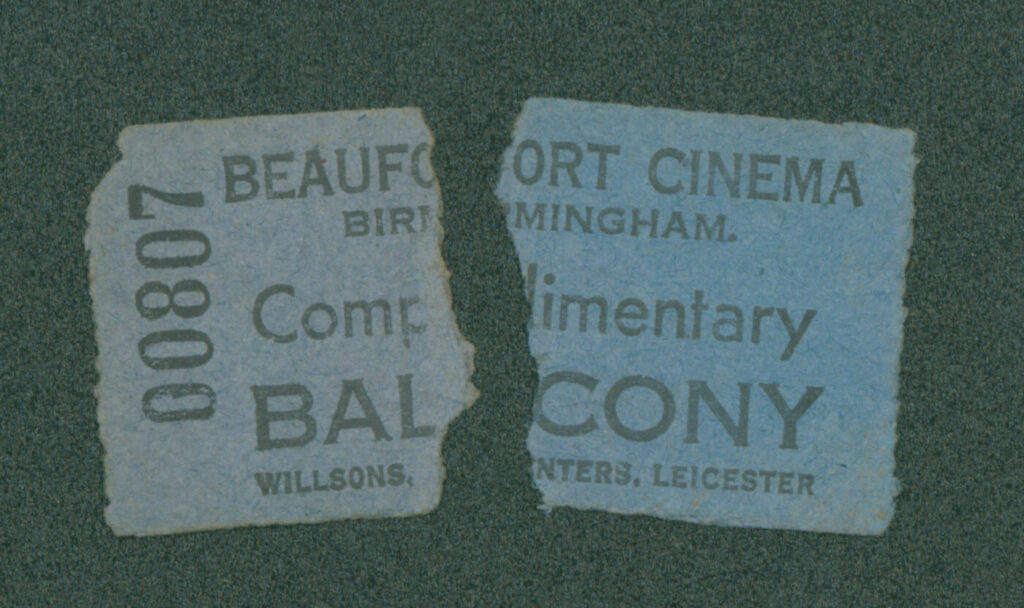On the 14th March 1914, the Grand Picture House – owned by Saltley Grand Picture House Co. and initially managed by Helsby Wright – opened its doors on Alum Rock Road as the second of four cinemas this road would host. The Grand was designed by one of the most prolific cinema architects in Birmingham, Archibald Hurley Robinson. He built also: The Beaufort & Harborne Picture House etc.
Seating held up to 950 and was provided by the cinema’s stalls and balcony where the audience could attend and watch films accompanied by the Grand’s 10-piece orchestra which gave this cinema the title of the “Scala of Alum Rock”.
It was in this very orchestra that Birmingham’s well loved and talented pianist-composer Harry Engleman first learnt the trade by playing in the cinema under his father, Joseph Engleman, who was musical director there at the time.
As for thousands of other musicians across the country, the coming of sound cinema meant unemployment for this orchestra, as described by cellist Gwen Berry in her diary quoted below.
The Grand closed its doors in 1959, showing Snowfire and Sabu and the Magic Ring as its farewell.
- 1914 | Damages occur due to German bombs
- c.1928 | Harry Engleman becomes pianist in the orchestra
- 1929 | Cinema starts showing "talkies"
- 1930 | Cellist in the orchestra, Miss Gwen Berry gets laid off as "talkies" begin to arrive
- 1939 | Cinema marks 25th anniversary with a programme of old newsreels dating back to 1914
236 Alum Rock Road, Saltley, Birmingham, B8 3BJ
“I returned to Alum Rock to find that Mr Cozens and Joseph [Engleman] had had words. Joseph having called him an impolite version of a cowardy custard, with the result that Joseph had his notice to depart in a fortnight’s time. (…) We’re finishing in a fortnight, and lots of other houses turning Talkie. So that it was obvious that the trouble was spreading. We find that there are several big Talkie pictures booked at our place very soon which I suppose will mean our departure.”
“Went over to Alum Rock to get my pay in the evening. Micky says they did well with the Talking Picture so roll on the sack and let’s get on to something else.”
“We had our orchestras, and special music effects had to be arranged for every picture. Every change of programme brought its own problems, and we got a lot of satisfaction out of solving them (…) I sometimes do miss them [silent films]. We really had to be on our toes. In the ‘silent’ days it was the exhibitor who had to put the film across (…) Nowadays box office success is made or broken in the studio.”
“(…) when I was about 15, or 16, I used to catch two trams. One to town, another tram from Dale End, which used to take us to this Grand Cinema at Alum Rock. And I remember I used to have to get underneath the curtain those days and sit by my father.
I’ll always remember the most frightening experience I had was when my father said to me, having been there for about six months, sitting and watching him, he said, ‘now, particularly watch for tonight, because tomorrow night, you are going to sit with the orchestra, you are going to sit and play the music that you’ve been watching and I shall stand up and conduct the orchestra.’ And I went away very frightened. I thought, ‘well, this is the end, I don’t think I’m going to bother with this. I don’t think I can do it.’
But anyway, I turned up the following night, I sat down and fortunately only played a bit of light music with the orchestra for the opening news. Then there was a comedy film. Only a few rhythmic numbers with the orchestra which turned out to be a very great thrill for me and then I remember that the manager of the cinema was so impressed with my father, the idea of him standing fronting the orchestra, me being in the pit he thought that was wonderful. He said, ‘I think we’ll have your son on the piano.’
And that’s how I really started.”




